 |
Nadia Ameli Nadia Ameli is an experienced researcher on economic, finance and policy aspects of climate change and related energy issues. Her research investigates questions related to financial barriers of low-carbon investments. She completed her PhD in Business Administration at the Polytechnic University of Marche (Ancona, Italy) and University of California (Berkeley, USA) with a focus on energy financing policy. She is a principal researcher fellow with a proleptic academic appointment at the UCL Institute for Sustainable Resources (UCL ISR). She joined UCL ISR in 2016 to lead the finance work of two EU Horizon2020 projects, entitled GREEN-WIN and RIPPLES. Both projects explore the crosscutting role of finance in overcoming barriers to climate adaptation, mitigation and sustainability action with a particular emphasis on exploring avenues for integrating climate public policies with mainstream finance framework and system. While at UC Berkeley together with Prof. Daniel Kammen, she explored an innovative approach, namely the Property Assessed Clean Energy, to link private funding to public financing mechanisms to facilitate access and affordability of low-carbon projects. Demonstrating the novelty of this scheme, PACE was awarded #1 World Changing Idea of 2009 by Scientific American. She is also bringing research insights into policymaking and practical experience to bear upon academic studies. Within the "Two Degrees Investing Initiative", she has co-organised two workshops on climate finance and has supported the research work at several international public policy organisations, including the OECD, the European Commission and the Global Green Growth Institute. |
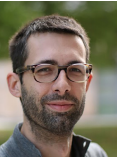 |
Matteo Ballottari Matteo Ballottari is an Associate Professor in Plant Physiology in the Department of Biotechnology at the University of Verona in Italy. He studies photosynthesis mostly in microalgae but also in plants, focusing on how it might be improved through an interdisciplinary approach. In particular, he investigates regulation and dynamics of light energy utilisation in order to increase algal biomass yield and high valuable product accumulation. Prof. Matteo Ballottari graduated in Biotechnology at the University of Verona in 2004. In 2008 he obtained his PhD in Molecular, Industrial and Environmental Biotechnology at the University of Verona, collaborating during his thesis with the University of California in Berkeley (USA). His PhD thesis was focused on the functional characterization of photosynthetic proteins in higher plants and received in 2009 the national award "Franca Rasi" for his PhD work. He is member of the Italian Society of Plant Biology and of the International Society of Photosynthesis Research. Since 2016, Matteo Ballottari was selected as a member of the Young Academy of Europe. Matteo Ballottari is involved in many national and European projects financed by public and private funds about the exploitation of photosynthetic organisms to produce biofuels and high value products. |
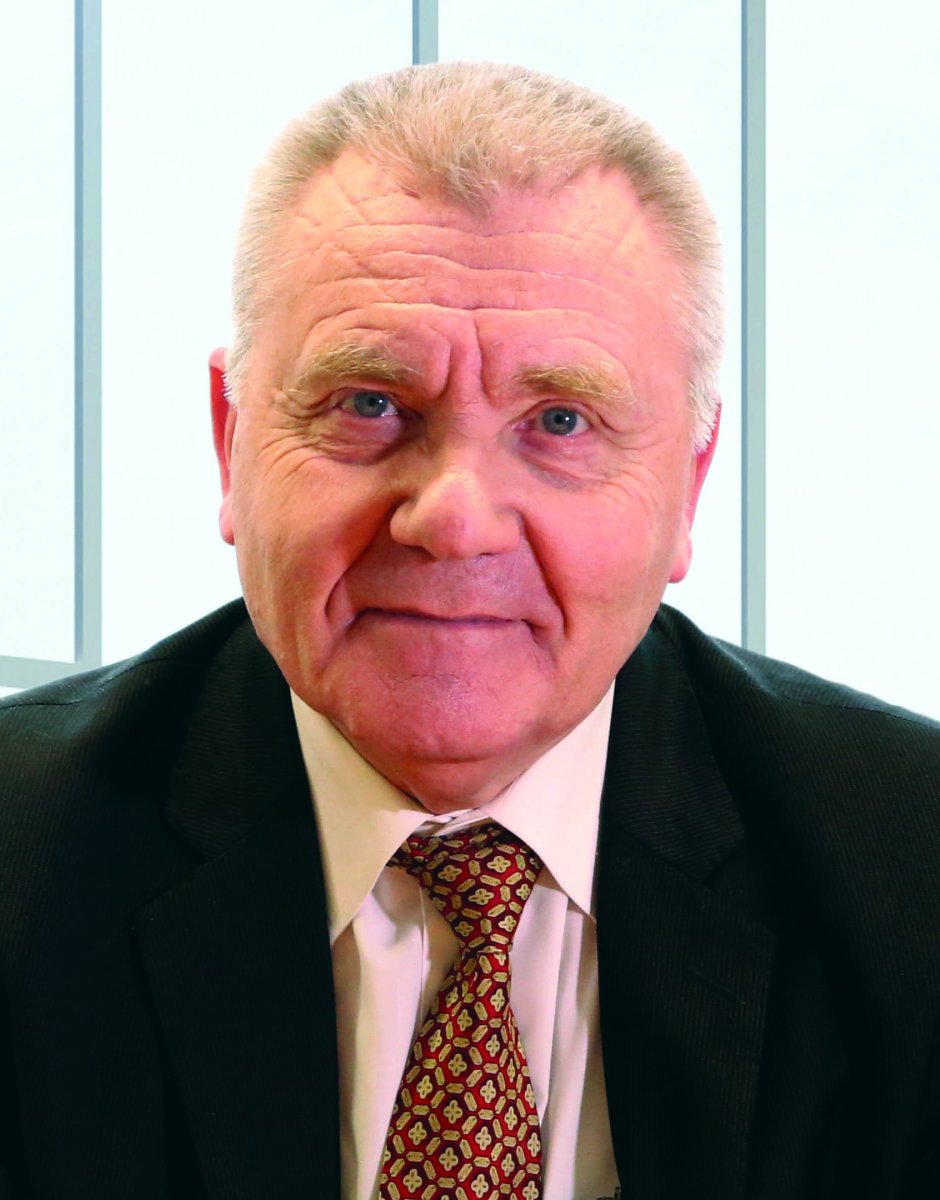 |
Jean-Pierre Bouguignon Prior to his mandate as president of the European Research Council, Jean-Pierre Bourguignon was the director of the Institut des Hautes Études Scientifiques from 1994 until 2013. This international research institute located near Paris stands as the European counterpart of the Institute for Advanced Study in Princeton. A mathematician by training, he spent his whole career as a fellow of the Centre National de la Recherche Scientifique and held a professor position at École Polytechnique from 1986 to 2012. From 1990 to 1992, he was president of the Société Mathématique de France, and president of the European Mathematical Society from 1995 to 1998. He is a former board member of the EuroScience organisation (2002-2006), and has served on EuroScience Open Forum (ESOF) committees since 2004. Jean-Pierre Bourguignon received the Prix Paul Langevin in 1987 and the Prix du Rayonnement Français in Mathematical Sciences and Physics from the Académie des Sciences de Paris in 1997. He is a foreign member of the Royal Spanish Academy of Sciences. In 2005, he was elected honorary member of the London Mathematical Society and has been the secretary of the mathematics section of the Academia Europaea. In 2008, he was made Doctor Honoris Causa of Keio University, Japan, and, in 2011, Doctor Honoris Causa of Nankai University, China. In 2017, he was elected honorary member of the German Association of Mathematicians and foreign member of the Portuguese Academy of Sciences. In 2019, he was made honorary member of the Polish Mathematical Society. |
 |
Nils Bunnefeld Nils Bunnefeld is a professor in biological and environmental sciences at the University of Stirling in the United Kingdom. He has studied biology and animal ecology at the University of Göttingen, Germany and the University of Groningen, the Netherlands, before taking up a PhD at Imperial College London. After two postdocs at the Swedish University of Agricultural Sciences and again at Imperial College London, he started a lectureship at the University of Stirling, Scotland. His main research interests encompass the sustainability and management of social-ecological systems using the combination of empirical data collection and modelling to investigate the interaction between human decision-making and the dynamics of ecosystems. In order to do this, he focusses on developing models and approaches to integrate ecological, social and economic data and theory with the aim to decompose synergies, trade-offs and conflicts between nature conservation and human livelihoods. |
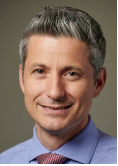 |
Patrice Daniel Cani Patrice D. Cani is leading a team at the Louvain Drug Research Institute (LDRI) of the University of Louvain and is a researcher from the Belgian Fund for Scientific Research (FRS-FNRS) and WELBIO investigator. After a BSc degree in dietetics he joined the Faculty of Medicine of UCLouvain where he received a MSc in Nutrition, another MSc in Health Sciences, and a PhD in Biomedical Sciences (physiology and metabolism). He received the prize "Baillet Latour Grant for Medical Research" (2015) and the "International Prize of Physiology Lucien Dautrebande" (2016). He has been elevated at the rank of Officer of the Walloon Merit and elected as associate member of the Royal Academy of Medicine of Belgium in 2016. He also received the Bauchau Chair at UNamur (2016) and the Francqui Chair at ULiège (2017). He published in 2007 the discovery of the concept of metabolic endotoxemia, and he recently discovered the beneficial role of the bacteria Akkermansia muciniphila on obesity and cardiometabolic risk factors. His main research interests are the investigation of interactions between gut microbes and host in the context of obesity, type 2 diabetes, cardiometabolic disorders and cancer. With more than 250 scientific research articles, reviews and book chapters, he is ranked in the top 1% world-class researchers with exceptional research performance and more than 26000 citations. His motto is : "In Gut We Trust". |
 |
Patrick Caron Patrick Caron is a veterinary doctor, with a PhD in development geography. He is a specialist of farming systems and territorial dynamics, with a special focus on livestock farming. He was appointed Vice President for International Affairs of the University of Montpellier in January 2019. In May 2019, he was appointed Chair of Agropolis International. He joined CIRAD in 1988 where he has been Director-General for Research and Strategy from 2010 to 2016, after having served as scientific director for the "Territories, Environment and People" Department of CIRAD (2001-2004) and as "Environments and Societies" Department director from 2007 to 2010. His works relate to the analysis of the role of agriculture and livestock in rural transformations, particularly in Brazil, Southern Africa and the Near East. Patrick Caron chairs the Scientific Council of AgroParisTech and is a member of the French National Council for Development and International Solidarity. In 2015, he chaired the organising committee of the Global Science Conference on Climate Smart Agriculture (Montpellier, France), in 2016 the international conference Agrichains and Sustainable Development and, in 2017, the International Conference on Living Territories. He is co-chairing the Conference on Global Food Security to be held in Montpellier, France, in June 2020. Patrick Caron was nominated as the chair of the High Level Panel of Experts of the Committee on World Food Security in November 2015. |
 |
Giulia Grancini Giulia Grancini received an MS in Physical Engineering in 2008 and obtained her PhD in Physics cum laude in 2012 at the Politecnico of Milan. Her experimental thesis focused on the realisation of a new femtosecond-microscope for mapping the ultrafast phenomena at organic interfaces. During her PhD, she worked for one year at the Physics Department of Oxford University where she pioneered new concepts within polymer/oxide solar cell technology. From 2012-2015, she was a post-doctoral researcher at the Italian Institute of Technology in Milan. In 2015, she joined the group of Prof. Nazeeruddin at Ecole Polytechnique Fédérale de Lausanne (EPFL) awarded with a Co-Funded Marie Skłodowska-Curie Fellowship. From 2016 to 2019, she benefited from a Swiss Ambizione Energy Grant. Giulia Grancini is Principal Investigator of the ERC StG Project "HYNANO" aiming at the development of advanced hybrid perovskites materials and innovative functional interfaces for efficient, stable, and environmentally friendly photovoltaics, one the biggest challenge nowadays in Europe. Within this field, Giulia contributed to reveal the fundamental lightinduced dynamical processes underlying the operation of such advanced optoelectronic devices whose understanding is paramount for a smart device optimization. Recently, she received the Swiss Physical Society Award in 2018 for Young Researcher and the IUPAP Young Scientist Prize in Optics. She authored 80 peer-reviewed scientific papers on material design and understanding of the interface physics which govern the operation of organic and hybrid perovskite devices. She is currently member of the Young Academy of Europe. |
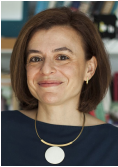 |
Natalia Fabra Natalia Fabra is a professor of economics and head of the EnergyEcoLab at Universidad Carlos III de Madrid (ES). She is a research fellow at the Centre for Economic Policy Research, associate member of the Toulouse School of Economics and research fellow at the University of Cambridge Energy Policy Research Group. She obtained her PhD in 2001 at the European University Institute (Florence), under the supervision of Prof. Massimo Motta. Natalia Fabra works in the field of industrial organisation, with emphasis in energy and environmental economics and regulation and competition policy. Her research papers are published in leading journals such as the American Economic Review, the Rand Journal of Economics, The Economic Journal, Energy Economics, The Journal of Industrial Economics, and the International Journal of Industrial Organization, among others. She is also associate editor at the Economic Journal and the Journal of Industrial Economics. Natalia Fabra has received two distinguished awards as Best Young Spanish Economist (one awarded by the Banco Sabadell Foundation, and the other by the Madrid regional government). Natalia Fabra has been research visiting fellow at several institutions, including the University of California Energy Institute (Berkeley), Nuffield College (Oxford), the Toulouse School of Economics, Northwestern University (Chicago), and the Energy Policy Research Group (Cambridge). |
 |
Eva Kondorosi Eva Kondorosi was born in Budapest, graduated (in biology) and received her PhD (in genetics) at the L. Eötvös University in Budapest. She was a postdoc at the Max Planck Institute (Köln) and visiting scholar at the Universities of Sussex, Harvard and Cornell. She was a research director at the Institut des Science Végétales (CNRS), then director of the BAYGEN Institute in Hungary. Currently, she directs the Symbiosis and Functional Genomics Unit at the Biological Research Centre in Szeged. Her primary research field is Rhizobium-legume symbiosis with recent focus on plantcontrolled differentiation of bacteria. For her original discoveries, she received several prestigious awards, including the Balzan Prize, the Szechenyi Prize and the IS-MPMI prize. She is full member of the Hungarian Academy of Sciences, a foreign associate of the National Academy of Sciences (USA), and a member of the following institutions or bodies: Academia Europaea (also member of its Board of Trustees), the European Molecular Biology Organization, the Board of Directors of the International Society for Molecular Plant-Microbe Interactions (until 2016), the German National Academy of Sciences Leopoldina, the French Academy of Agriculture and the European Academy of Microbiology. She was vice-president of the European Research Council and was a member of the UN Secretary General’s Scientific Advisory Board. |
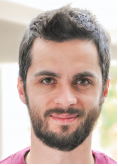 |
Vasilis Kostakis Vasilis Kostakis is Professor of Peer-to-Peer (P2P) Governance within the Ragnar Nurkse Department of Innovation and Governance at TalTech. He is also a faculty associate within the Berkman Klein Center for Internet and Society at Harvard University, and a visiting professor within the Institute of Environmental Science and Technology at Autonomous University of Barcelona. Moreover, he is a fellow at the Royal Society for the Encouragement of Arts, Manufactures and Commerce. Vasilis Kostakis is the founder of the P2P Lab and has been the research coordinator of the P2P Foundation, winner of the 2016 Golden Nica for Digital Communities. In 2018, he was awarded a four-year grant from the European Research Council, to study the convergence of the digital commons with local manufacturing technologies. Along with an interdisciplinary team of scholars, activists, and social entrepreneurs, Vasilis focuses on how to create an economy based on locally sustainable communities that are digitally interconnected. He has written essays for several outlets such as the Harvard Business Review and Aeon. His work has appeared in 15 languages. |
 |
Motoko Kotani Motoko Kotani is working at the Mathematical Institute of Tohoku University in Japan. Her research field is geometry. She also applies the geometry, which she develops, to materials science as the director of the Advanced Institute for Materials Research at Tohoku University. She serves RIKEN as Executive Director in charge of both international relationship and of diversity. She is an executive member at the Cabinet office of the Council for Science, Technology and Innovation in Japan. |
 |
Anna Kuparinen Anna Kuparinen is a professor in the Department of Biological and Environmental Science at the University of Jyväskylä in Finland. Her research interests cover fundamental questions within the fields of ecology and evolutionary biology, such as Allee effects, life-history evolution, and ecoevolutionary dynamics, which she investigates using mechanistic simulation models. She mainly focuses on fish, aquatic ecosystems, and their sustainable harvesting. |
 |
Anne Magurran Anne Magurran’s research interests focus on biological diversity – its measurement, evolution, maintenance and conservation. Ever since her PhD on Irish woodlands at the University of Ulster, she has been interested in how to measure biological diversity as shown by her most recent book on the topic "Biological Diversity: Frontiers in Measurement and Assessment". Her ERC grant BioTIME was concerned with how biological diversity is changing over time. It addressed this question in two ways: by compiling the BioTIME database (biotime.st-andrews.ac.uk) of ecological assemblage time series, that is assemblages around the world that have been monitored over a number of years using the same methodology; and through field work to quantify biodiversity change in freshwater ecosystems in the Caribbean island of Trinidad. The BioTIME database, which now contains data from over 600,000 localities across the Earth, is showing that the world’s ecosystems are being restructured at rates that exceed the predictions of the best ecological theory we have. These findings are mirrored in the detailed field surveys of tropical rivers. Together they alert researchers to the rapid compositional reorganisation occurring in ecosystems and highlight fundamental and applied challenges for biodiversity scientists. Thanks to her ERC Proof of Concept grant BioChange, the BioTIME database is now open access and free to anyone, anywhere in the world, to use for research, education or conservation. |
 |
Oksana Mont Oksana Mont is a professor in sustainable consumption governance. She has a PhD in Technology, MSc in Environmental Management and Policy, and MSc in Biology and Chemistry. She conducts inter-disciplinary and international research on sustainable business models, sustainable consumption and lifestyles and sustainable consumption policy. The current topical domain is the sharing economy and circular economy. She leads a research group on Sustainable consumption governance at the International Institute for Industrial Environmental Economics at Lund University and supervises seven PhD students. She has over 15 years of project leadership experience. She is a Principal Investigator of the 5-year programme on urban sharing funded by the European Research Council and a 4-year project on urban reconomy funded by the Swedish Research Council Formas. She also leads projects on business models in two 4-year programmes funded by MISTRA on "REES – Resource-Efficient and Effective Solutions" and "Mistra Sustainable Consumption – from niche to mainstream". She is an editor of a book on "Research Agenda for Sustainable consumption governance" (2019) and co-editor of a book with Max Koch on "Sustainability and the Political Economy of Welfare (2016) Routledge. She is an author of more than 200 academic publications and official reports. |
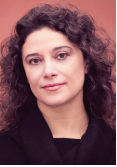 |
Elisa Morgera Elisa Morgera is the director of the UK-funded One Ocean Hub, a 5-year global inter-disciplinary collaboration on sustainable and inclusive ocean governance spanning marine and social sciences, arts and law in Africa, South Pacific and the Caribbean. She specialises in international, European and comparative environmental law, with a particular focus on the interaction between biodiversity law and human rights (particularly those of indigenous peoples and local communities), equity and sustainability in natural resource development, oceans governance, and corporate accountability. She has also researched the environmental dimensions of the external relations of the European Union (EU). |
 |
Markos Papageorgiou Papageorgiou received the Diplom-Ingenieur and Doktor-Ingenieur (honors) degrees in Electrical Engineering from the Technical University of Munich and was a free associate with Dorsch Consult, Munich (1982-1988), and with Institute National de Recherche sur les Transports et leur Sécurité (INRETS), Paris, France (1986-1997). From 1988 to 1994, he was a professor of automation at the Technical University of Munich. He joined his current institution in 1994. He held several visiting professor positions around the world at: Politecnico di Milano, Ecole Nationale des Ponts et Chaussées, Paris, at MIT, Boston, University of Rome La Sapienza, Italy. He is a distinguished visiting professor at Tsinghua University, Beijing, China, an honorary visiting professor of the University of Belgrade, Serbia and the Dynamic Systems and Simulation Laboratory he has been heading since 1994 and was a visiting scholar at the University of California, Berkeley. Markos Papageorgiou authored/ edited seven books and over 500 technical papers. His research interests include automatic control and optimisation theory and applications to traffic and transportation systems, water systems and further areas. He was the editor-in-chief of Transportation Research – Part C (2005-2012). He also served as an associate editor of IEEE Control Systems Society – Conference Editorial Board, of IEEE Transactions on Intelligent Transportation Systems and other journals. His awards are numerous: Life Fellow of IEEE, Fellow of IFAC, a DAAD scholarship, the Eugen-Hartmann Award from the Union of German Engineers, a Fulbright Lecturer/Researcher Award, the IEEE Intelligent Transportation Systems Society Outstanding Research Award and the Outstanding Application Award, the IEEE Control Systems Society Transition to Practice Award, the IEEE Transportation Technologies Award. |
 |
Ioannis Papakonstantinou Ioannis Papakonstantinou received his diploma in electrical and computer engineering from the National Technical University of Athens and his PhD in optical interconnects from University College London (UK) in 2008. In 2008-2009, he worked for Sharp Laboratories of Europe, investigating subwavelength diffractive films to improve the brightness, uniformity and power consumption of liquid crystal displays. He joined CERN-European Organisation for Nuclear Research in 2009, to work on optical fibre links for the distribution of timing-trigger and control signals in the Large Hadron Collider. He was appointed as a lecturer in the Electronic and Electrical Engineering Department at UCL in 2011, where he founded the Photonic Innovations Lab. He was promoted to senior lecturer in 2015 and to professor of photonics and nanofabrication in 2018. His research focuses on nanophotonics and nanotechnology fabrication methods for energy and biomedical applications. He currently serves on UCL's Board of Energy Directors. Previously, he was a member of the steering committee of CERN’s Crystal Clear Collaboration and a member of EPSRC's Early Career Forum in Advanced Manufacturing. He is very keen to translate research from the work bench to the market and has already overseen the work of his PhD through successfull commercialisation, moreover he is the co-founder of a successful university spinout. |
 |
Jean-Eric Paquet Jean-Eric Paquet has been working as the Director-General for Research and Innovation (DG RTD) since April 2018. He started working with the European Commission in 1993. From 2002 until 2004, he was the Deputy Head of Cabinet of former Commissioner for Research, Philippe Busquin. Then he worked as a Head of Unit within the DG Mobility and Transport before becoming the Director. In 2013, he joined the DG for Neighbourhood and Enlargement Negotiations. Before starting his current position, Jean-Eric Paquet served as Deputy Secretary General of the Juncker Commission. |
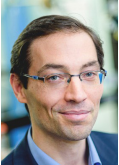 |
Nicolas Plumeré Nicolas Plumeré graduated at the University of Glasgow with a honours degree in Chemistry in 2004 with a first class distinction. He obtained his PhD with summa cum laude in 2009 at the University of Tübingen, Germany. After a short fellowship as researcher at the company NECi, in the USA, Nicolas Plumeré became a group leader at the Center for Electrochemical Sciences, Faculty for Chemistry and Biochemistry, Ruhr-Universität Bochum in 2010. He was promoted to a tenured professorship in analytical chemistry in 2017, and currently serves as one of the PIs of the Excellence Cluster RESOLV from the German Research Foundation that started in 2019. He is strongly invested in his scientific community notably by acting on the council of the Bioelectrochemical Society and as an advisory board member of Chemical Science, the flagship journal of the Royal Society of Chemistry. He was awarded the 2019 Luigi Galvani Prize (a biannual award for scientists under the age of 45 with excellent track-records in the field of bioelectrochemistry). In 2018, he co-founded the company Silverbear specialised in point-of-use sensing for smart agriculture. The Plumeré lab has specialised in interfacing biocatalytic systems and electrodes for application in energy conversion and energy conversion schemes. The group's expertise comprises organic chemistry for synthesis of redox interfaces, electrochemistry for quantification of electron transfer pathways, mathematical modeling for predicting photocurrent and electrochemical microarrays for biomolecule screening. Notable achievements include electrochemical sensing for applications in precision agriculture and electrocatalytic processes for biophotovoltaics and biofuel cells. |
 |
Johan Rockström Johan Rockström is an internationally recognised scientist on global sustainability issues. He led the development of the Planetary Boundaries Framework for human development in the current era of rapid global change. He is a leading scientist on global water resources, with more than 25 years experience in applied water research in tropical regions, and more than 150 research publications in fields ranging from applied land and water management to global sustainability. In addition to his research endeavours, which have been widely used to guide policy, Johan Rockström is active as a consultant for several governments and business networks. He also acts as an advisor for sustainable development issues at international meetings including the World Economic Forum, the United Nations Sustainable Development Solutions Network and the United Nations Framework Convention on Climate Change Conferences. Johan Rockström chairs the advisory board for the EAT Foundation and the Earth League and has been appointed as chair of the newly formed Earth Commission. |
 |
Samuel Sanchez Samuel Sanchez is an ICREA Research Professor and group leader at the Institute of Bioengineering of Catalonia (ES) since 2015. Since 2019, he also acts as deputy director of the Institute. He got his PhD in Chemistry from the Universitat Autònoma de Barcelona in 2008. In 2009, he worked at NIMS, Japan and from 2010 until 2013, he was group leader at the Institute for Integrative Nanosciences, IFW Dresden, Germany and at the Max Planck Institute for Intelligent Systems from 2013-2018. He received several awards: Guinness World Record® 2010 and 2017 for smallest jet engine; MIT TR35 as "Innovator of the year under 35" Spain 2014; Princess of Girona Scientific Research Award 2015 (Royal House Foundation); "Joven Relevante" Award by the Círculo Ecuestre de Barcelona and the National Research Award for Young Talent from the Catalan Foundation of Research and Innovation. Currently, the main research lines in his group are: nanofabrication of self-powered micro- and nanorobots, from fundamentals to biomedicine and environmental applications; 3D bioprinting for soft robotics and biomedical engineering; fabrication of ultracompact, flexible devices for biosensing and physics of active colloids near surfaces. He published around 130 papers, with close to 9000 citations and consolidated his group as one of the leading ones in catalytic nano-motors. |
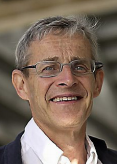 |
Jordi Sunyer Jordi Sunyer is the coordinator of the Childhood and Environment Research Programme and the Barcelona Life Study (birth) cohorts in Spain and principal investigator of several international studies at the ISGlobal (World Institute of Health) in Barcelona. He has an extensive experience in the area of respiratory and neurodevelopmental epidemiology and the founding and coordination of birth cohorts in Spain as well harmonisation of birth cohorts in Europe. Specifically, he has over 25 years of experience conducting research aimed at defining the pre-natal and early life exposure contributions to child health. His work has included study design, methods development, ascertainment of study cohorts, and statistical analyses. He has a demonstrated record of successful research in the areas of the effect of POPs, hormonal disruptors and air pollution on asthma, lung function, obesity and neurodevelopment in children, with around 700 scientific articles, cited more than 30,000 times. He also developed a great activity for the translation of these findings into prevention producing reports, guidelines and recommendations for WHO, for the UN-IPCS programme and in government commissions. In 2014, he received the most prestigious award in environmental epidemiology, the John Goldsmith Prize. |
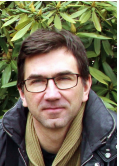 |
Peter Szabó Péter Szabó is an environmental historian and historical ecologist. He holds MA degrees in history, English, and medieval studies and completed his PhD in medieval studies at the Central European University in Budapest, Hungary. His research interests lie in the long-term interactions between human societies and wooded environments, with a special focus on what historical knowledge can contribute to today’s nature conservation. His publications cover issues ranging from prehistoric forest dynamics through medieval woodland management to the use of large databases in environmental history. In 2012–2016, he led an interdisciplinary team of historians, archaeologists, vegetation ecologists, palaeoecologists and GIS specialists in the LONGWOOD ERC project. Because his work relies heavily on crossing the "great divide" between the humanities and the natural sciences, he also published extensively on the conceptual aspects of connecting history and ecology. Between 2017 and 2019, he served as the president of the European Society for Environmental History. |
 |
Maarten van Ham Maarten van Ham is Professor of Urban Geography and head of the Urban Studies research group at the Department of Urbanism, Delft University of Technology (NL). He is a population geographer with a background in economic and urban geography. He also is a research fellow at the Institute of Labor Economics in Germany and professor of geography at the University of St Andrews (UK). He investigates people-place relationships at different spatial scales, from neighbourhoods to cities to regions. Through his research he aims to better understand how neighbourhoods, cities and regions develop, and how different spatial configurations and structures emerge (within and between cities), and how these configurations affect socioeconomic outcomes for people across spatial scales. His group has a strong international reputation for research on socio-economic and ethnic segregation, neighbourhood effects, neighbourhood change, urban regeneration, residential mobility & migration, and housing. His research is of an international and interdisciplinary nature with research projects in the UK, the Netherlands, Germany, Sweden, Finland, Lithuania, Estonia, Spain, and China. |
 |
Lisa Wingate Lisa Wingate is a researcher at the Institut National de la Recherche Agronomique in Bordeaux, France. Her undergraduate, postgraduate and postdoctoral research has a strong foundation in ecosystem physiology and geosciences. She has worked alongside experimentalists and modellers to develop theoretical understanding of stable isotope fractionation in a range of ecological systems in order to interpret the responses of ecosystem components to climate, holding positions at the University of Edinburgh and the University of Cambridge before joining the Institut National de la Recherche Agronomique. There, her research lies at the interface between geochemistry, physics, biology and ecology, and aims to describe the regulation of atmospheric CO2 and COS concentrations at scales spanning the enzyme to the globe. |

